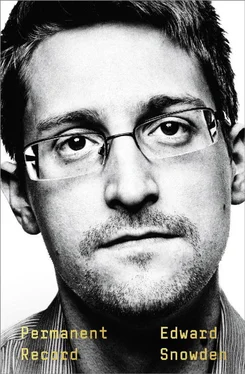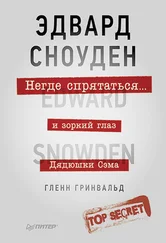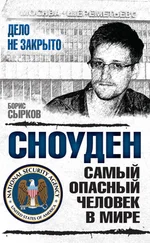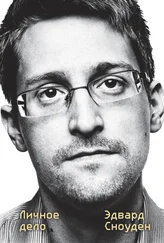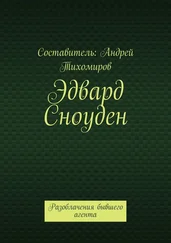Gus told the journalists that the agency could track their smartphones, even when they were turned off—that the agency could surveil every single one of their communications. Remember: this was a crowd of domestic journalists. American journalists. And the way that Gus said “could” came off as “has,” “does,” and “will.” He perorated in a distinctly disturbed, and disturbing, manner, at least for a CIA high priest: “Technology is moving faster than government or law can keep up. It’s moving faster … than you can keep up: you should be asking the question of what are your rights and who owns your data.” I was floored—anybody more junior than Gus who had given a presentation like this would’ve been wearing orange by the end of the day.
Coverage of Gus’s confession ran only in the Huffington Post . But the performance itself lived on at YouTube, where it still remains, at least at the time of this writing six years later. The last time I checked, it had 313 views—a dozen of them mine.
The lesson I took from this was that for my disclosures to be effective, I had to do more than just hand some journalists some documents—more, even, than help them interpret the documents. I had to become their partner, to provide the technological training and tools to help them do their reporting accurately and safely. Taking this course of action would mean giving myself over totally to one of the capital crimes of intelligence work: whereas other spies have committed espionage, sedition, and treason, I would be aiding and abetting an act of journalism. The perverse fact is that legally, those crimes are virtually synonymous. American law makes no distinction between providing classified information to the press in the public interest and providing it, even selling it, to the enemy. The only opinion I’ve ever found to contradict this came from my first indoctrination into the IC: there, I was told that it was in fact slightly better to offer secrets for sale to the enemy than to offer them for free to a domestic reporter. A reporter will tell the public, whereas an enemy is unlikely to share its prize even with its allies.
Given the risks I was taking, I needed to identify people I could trust who were also trusted by the public. I needed reporters who were diligent yet discreet, independent yet reliable. They would need to be strong enough to challenge me on the distinctions between what I suspected and what the evidence proved, and to challenge the government when it falsely accused their work of endangering lives. Above all, I had to be sure that whoever I picked wouldn’t ultimately cave to power when put under pressure that was certain to be like nothing they, or I, had ever experienced before.
I cast my net not so widely as to imperil the mission, but widely enough to avoid a single point of failure—the New York Times problem. One journalist, one publication, even one country of publication wouldn’t be enough, because the US government had already demonstrated its willingness to stifle such reporting. Ideally, I’d give each journalist their own set of documents simultaneously, leaving me with none. This would shift the focus of scrutiny to them, and ensure that even if I were arrested the truth would still get out.
As I narrowed down my list of potential partners, I realized I’d been going about this all wrong, or just wastefully. Instead of trying to select the journalists on my own, I should have been letting the system that I was trying to expose select them for me. My best partners, I decided, would be journalists whom the national security state had already targeted.
Laura Poitras I knew as a documentarian, primarily concerned with America’s post-9/11 foreign policy. Her film My Country, My Country depicted the 2005 Iraqi national elections that were conducted under (and frustrated by) the US occupation. She had also made The Program , about the NSA cryptanalyst William Binney—who had raised objections through proper channels about TRAILBLAZER, the predecessor of STELLARWIND, only to be accused of leaking classified information, subjected to repeated harassment, and arrested at gunpoint in his home, though never charged. Laura herself had been frequently harassed by the government because of her work, repeatedly detained and interrogated by border agents whenever she traveled in or out of the country.
Glenn Greenwald I knew as a civil liberties lawyer turned columnist, initially for Salon —where he was one of the few who wrote about the unclassified version of the NSA IG’s Report back in 2009—and later for the US edition of the Guardian . I liked him because he was skeptical and argumentative, the kind of man who’d fight with the devil, and when the devil wasn’t around fight with himself. Though Ewen MacAskill, of the British edition of the Guardian , and Bart Gellman of the Washington Post would later prove stalwart partners (and patient guides to the journalistic wilderness), I found my earliest affinity with Laura and Glenn, perhaps because they weren’t merely interested in reporting on the IC but had personal stakes in understanding the institution.
The only hitch was getting in touch.
Unable to reveal my true name, I contacted the journalists under a variety of identities, disposable masks worn for a time and then discarded. The first of these was “Cincinnatus,” after the legendary farmer who became a Roman consul and then voluntarily relinquished his power. That was followed by “Citizenfour,” a handle that some journalists took to mean that I considered myself the fourth dissident-employee in the NSA’s recent history, after Binney and his fellow TRAILBLAZER whistleblowers J. Kirk Wiebe and Ed Loomis—though the triumvirate I actually had in mind consisted of Thomas Drake, who disclosed the existence of TRAILBLAZER to journalists, and Daniel Ellsberg and Anthony Russo, whose disclosure of The Pentagon Papers helped expose the deceptions of the Vietnam War and bring it to an end. The final name I chose for my correspondence was “Verax,” Latin for “speaker of truth,” in the hopes of proposing an alternative to the model of a hacker called “Mendax” (“speaker of lies”)—the pseudonym of the young man who’d grow up to become WikiLeaks’ Julian Assange.
You can’t really appreciate how hard it is to stay anonymous online until you’ve tried to operate as if your life depended on it. Most of the communications systems set up in the IC have a single basic aim: the observer of a communication must not be able to discern the identities of those involved, or in any way attribute them to an agency. This is why the IC calls these exchanges “non-attributable.” The pre-Internet spycraft of anonymity is famous, mostly from TV and the movies: a safe-house address coded in bathroom-stall graffiti, for instance, or scrambled into the abbreviations of a classified ad. Or think of the Cold War’s “dead drops,” the chalk marks on mailboxes signaling that a secret package was waiting inside a particular hollowed-out tree in a public park. The modern version might be fake profiles trading fake chats on a dating site, or, more commonly, just a superficially innocuous app that leaves superficially innocuous messages on a superficially innocuous Amazon server secretly controlled by the CIA. What I wanted, however, was something even better than that—something that required none of that exposure, and none of that budget.
I decided to use somebody else’s Internet connection. I wish that were simply a matter of going to a McDonald’s or Starbucks and signing on to their Wi-Fi. But those places have CCTV, and receipts, and other people—memories with legs. Moreover, every wireless device, from a phone to a laptop, has a globally unique identifier called a MAC (Machine Address Code), which it leaves on record with every access point it connects to—a forensic marker of its user’s movements.
Читать дальше
